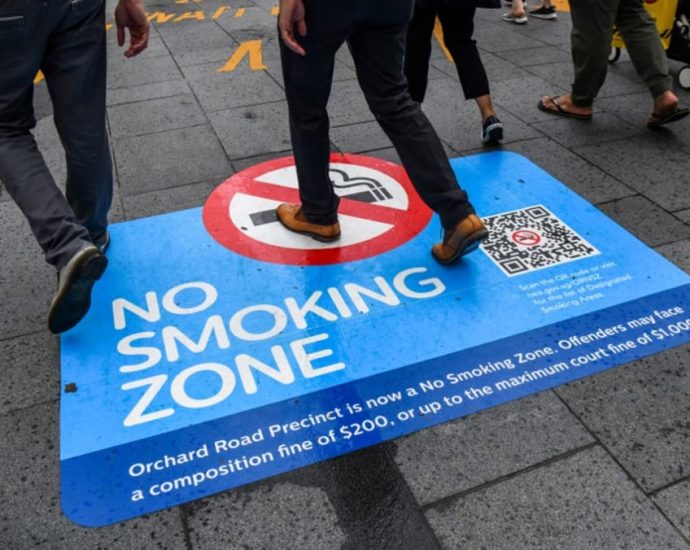PM to sign Sri Lanka FTA in days

PUBLISHED : 2 Feb 2024 at 04:00
Thailand and Sri Lanka will sign a free trade agreement (FTA) this week during Prime Minister Srettha Thavisin’s trip to the island country, said spokesman Chai Watcharonke yesterday.
Mr Srettha has been invited by Sri Lankan Premier Ranil Wickremesinghe as a guest of honour for Sri Lanka’s Independence Day celebrations from tomorrow until Sunday.
The upcoming FTA will be Thailand’s 15th contract of its kind and the first since Mr Srettha took the premiership last year.
The contract aims to bring Thai goods to new markets in South Asia by accelerating the opening of gateways for trade and investment.
Expanding Thai trade to newer territories while sustaining existing markets is part of the government’s proactive diplomatic policy, said Mr Chai.
Although Sri Lanka is a small country of just 22 million people, it is an interesting market due to its geographical location in the Indian Ocean, which is a strategic point for shipping, according to the Department of Trade Negotiations (DTN).
The DTN revealed that the overall trade value between Thailand and Sri Lanka from January to October last year had jumped to US$320.37 million (11.3 billion baht).
Thailand’s main exports there include rubber products, fabrics, gemstones, machinery and plastic pellets, while imported goods include jewellery, electrical components, garments, plant products and chemicals.
The new FTA is expected to benefit Thailand’s exports of automotive parts, textiles, electrical appliances, machinery, steel products, paper, processed food and animal feed.
Thailand hopes to conclude an FTA with the European Union next year.
Elderly living allowance raise gets backing

PUBLISHED : 2 Feb 2024 at 04:00
The House committee on social welfare will forward to parliament a bill raising the monthly living allowance currently offered to elderly poor people to 3,000 baht per month.
Citing findings from a new study by a parliamentary panel looking into a proper basic state pension system, the House committee yesterday signed in support of the bill to be submitted to the House for deliberation, said Natthacha Boonchaiinsawat, chairman of the House committee.
The current rates of monthly living allowances paid to elderly poor people in the government’s state welfare scheme are no longer sufficient to cope with current living costs, said Mr Natthacha.
The ideal minimum monthly living allowance for the elderly poor should be 3,000 baht, said Wanvipa Maison, chair of the parliamentary panel studying the rate.
This monthly rate meets the poverty line specified by the National Economic and Social Development Council.
The baseline monthly living allowance for everyone between 60 and 69 years of age is currently fixed at 600 baht. The rates go up to 700 baht when people reach 70 and 800 baht when people reach 80 and beyond.
Each year, about 90 billion baht is spent on funding the payment of living allowances to around 11.8 million poor elderly people.
In comparison, the budget for funding the payment of pensions paid to retired civil servants exceeds 300 billion baht annually, Ms Wanvipa said.
This huge gap could be narrowed by raising the minimum monthly living allowance for the poor elderly from 600 baht to 1,200 baht, which is estimated to require about 50 billion to 60 billion baht in extra funding, she said.
Ms Wanvipa said that more raises would then be introduced progressively in time to reach the 3,000-baht-a-month mark.
The government now has around 40 billion baht at its disposal from a central budget for use in the form of a contingency fund.
More money could be drawn from the budget earmarked as a contingency fund at the ministerial level, she said.
AOT braces for surge in tourists

PUBLISHED : 2 Feb 2024 at 04:00
The government says it will work with Airports of Thailand (AOT) to enhance services and security for passengers, especially Chinese, during the Lunar New Year.
More than three million travellers are expected to arrive in Thailand during the festival.
Transport Minister Suriya Jungrungreangkit said AOT’s six international airports, Suvarnabhumi, Don Mueang, Phuket, Chiang Mai, Hat Yai and Chiang Rai, are expected to welcome about 3.5 million passengers over Chinese New Year between Feb 5 and 14.
With the high number of travellers, the AOT is required to have appropriate security measures and work with other agencies to deal with them and the increased air traffic, according to the minister.
He also ordered an inspection of automatic channels, more immigration officers on duty as well as the utilisation of technology to help maximise service quality.
According to Mr Suriya, more than eight million Chinese tourists are expected to visit Thailand this year, a 200% surge, due to the visa-free agreement between Thailand and China. The agreement becomes effective on March 1.
Government spokesman Chai Wacharonke said that within an hour of the visa exemption announcement, Thailand-related searches on the Chinese travel agency platform CTrip increased by 90%.
Prime Minister Srettha Thavisin then personally invited Chinese citizens to visit Thailand in a livestream message on CTrip.
Meanwhile, Suvarnabhumi airport, which is expected to welcome the highest number of passengers during Chinese New Year, is looking to provide better services — especially for Chinese visitors — including the provision of interpreters and signs in Chinese at shops, restaurants, etc.
Deputy AOT director Kirati Kitmanawat said almost 3,524,000 passengers were expected to travel through its six international airports during the upcoming Chinese holiday, which is a 20% increase from last year.
Of that number, more than 1,7 million will come through Suvarnabhumi airport.
Another initiative drawing visitors to Thailand is the 90-day visa for tourists learning Muay Thai in Phuket. The initiative is part of the government’s plan to promote the martial art as part of Thailand’s soft power.
MFP faces dissolution bid

Activists cite stance on lese majeste to EC
The Move Forward Party (MFP) may be facing the prospect of disbandment as prominent activists have petitioned the Election Commission (EC) to initiate dissolution proceedings against it due to the party’s stance on royal insult laws.
Political activist Ruangkrai Leekitwattana filed a petition with the EC on Thursday, asking it to pursue a dissolution case against the main opposition party.
The petition comes after the Constitutional Court ruled on Wednesday that the MFP’s continuous efforts to amend Section 112 of the Criminal Code, also known as the lese-majeste law, indicated an intention to undermine the constitutional monarchy.
Mr Ruangkrai said he based his petition on Section 92 of the organic law on political parties.
This states that if the EC has evidence pointing to a political party’s attempt to overthrow the constitutional monarchy, it must petition the Constitutional Court to consider dissolving that party and banning its executives from applying to run in elections for 10 years.
“The court’s ruling is legally binding on all agencies. The EC must carry out its duty,” Mr Ruangkrai said.
The court’s ruling on Wednesday supported the allegation Move Forward was attempting to end the constitutional monarchy through its proposal to amend the lese-majeste law.
Mr Ruangkrai said he also asked the EC to seek the court’s ruling on whether MFP executives should be banned from running in elections due to the same alleged wrongdoing. He said he would file a related petition with the National Anti-Corruption Commission (NACC).
The former senator said he was gathering evidence and would decide whether to file a similar petition against the ruling Pheu Thai Party.
Pheu Thai leader Paetongtarn Shinawatra and Prime Minister Srettha Thavisin referred to amending Section 112 during their election campaigns last year, Mr Ruangkrai said.
The EC also received a similar petition yesterday from lawyer Theerayut Suwankesorn. Mr Theerayut asked the Constitutional Court last year to halt the MFP’s attempts to amend Section 112.
He said Wednesday’s ruling obliged the EC to take action against the MFP.
The lawyer also said he would ask the NACC today to investigate claims of a serious ethical violation by former Move Forward leader Pita Limjaroenrat and 43 other Move Forward MPs who submitted the bill to amend Section 112.
MPs are required by law to meet certain ethical standards, including the safeguarding of the royal institution.
Failure to do so is considered a serious ethical violation, resulting in the restriction of the wrongdoers’ rights to participate in any election and the suspension of their electoral rights for a period of 10 years.
Sonthiya Sawasdee, a former adviser to the House committee on legal affairs, said he would file a similar petition asking the NACC to launch a probe into the ethical conduct of the 44 MFP lawmakers.
Responding to Mr Ruangkrai’s threat to file a party dissolution case against Pheu Thai, Sorawong Thienthong, Pheu Thai’s secretary-general, said yesterday Mr Srettha had only responded to reporters’ questions about a proposed amendment to Section 112 when he was a prime ministerial candidate.
Mr Sorawong insisted that amending Section 112 had not been one of the party’s campaign policies, and it had focused mainly on bread-and-butter issues affecting people’s everyday lives.
Describing Section 112 as a delicate issue, he said: “We have to uphold the monarchy and avoid doing anything inappropriate.”
Teerajchai Phunthumas, an MFP MP for Bangkok and an opposition whip, said the party would study the full text of the Constitutional Court’s ruling before taking any action.
“If a dissolution case is brought against the party, we are ready to fight,” he said.
On Wednesday, the Constitutional Court ordered the MFP to cease all attempts to amend Section 112.
It said campaigning on the issue is considered an attempt to end the constitutional democracy with the King as head of state in violation of Section 49 of the constitution.
The court said Mr Pita and the party tried to either change or revoke Section 112 when its 44 MPs submitted a bill to amend Section 112 on March 25, 2021.
3 more firms charged over smuggling

PUBLISHED : 2 Feb 2024 at 04:00
The Ministry of Agriculture and Cooperatives has filed charges against three more companies suspected of being involved in smuggling pork and falsifying documents.
Thanadol Suwannaritr, deputy chief of the ministry’s Nakaraja Task Force, said yesterday his team had found an additional three companies linked to the scheme. They are among 11 firms now being investigated by the Department of Special Investigation (DSI).
He said the three companies had falsified documents by declaring their shipments to be products related to marine fish. But when the authority opened the containers, it found a large quantity of pork inside.
The team filed a complaint with the Central Investigation Bureau for further investigation.
Mr Thanadol said the firms are facing three charges: giving a false statement to the authorities, falsifying documents, and violating the Computer-related Crime Act BE 2550 (2007).
He said the team had expanded its investigation to include an additional 21 shipping containers at Laem Chabang Port in Chon Buri province last December. The containers were seized by the Customs Department as the owners of the shipment had failed to present all the required documents.
The Department of Fisheries and the Department of Livestock Development worked together to check the documents and found that at least 20 had been falsified by the three companies.
Some of those documents were related to animal health certification, but the product cited according to the country of origin was different from the product inside the containers.
“We will keep working to abolish any acts of illegally importing pork. More updates will be released shortly, showing links with the mastermind of the operation. We have collaborated with other agencies to boost our work for better results,” Mr Thanadol said.
The ministry has been investigating illegal imports of pork that occurred from 2021 to 2023 when the country was facing a pork shortage.
Last year, local authorities confiscated 76,000 tonnes of smuggled pork found in 161 shipping containers, leading to a wider investigation.
The case was then submitted to the DSI, which subsequently issued arrest warrants for executives from at least eight companies.
The ministry has also set up a committee to investigate any authorities suspected of involvement.
Land Bridge roadshow to woo Chinese

PUBLISHED : 2 Feb 2024 at 04:00
Transport Minister Suriya Jungrungreangkit said yesterday that his ministry will send a Land Bridge megaproject roadshow to China next month.
Mr Suriya said Chinese Foreign Affairs Minister Wang Yi, who recently visited Thailand, stated that China’s government is interested in the project, which led to the Thai government’s roadshow preparations.
The ministry will submit the project report to the Chinese embassy in Thailand next week, which will pass the report to the Chinese government before the roadshow, he said.
The 1-trillion-baht project, connecting Ranong with Chumphon in southern Thailand, is expected to develop a logistics network while helping ease congestion in the Strait of Malacca in the next 10 years.
The project comprises deep-water ports in both provinces, a motorway cutting across the land to connect the two provinces and a railway system.
Mr Suriya said research and study on the project conducted by the Office of Transport and Traffic Policy and Planning (OTP) is almost complete.
The project’s environment and health impact assessment (EHIA) report is expected to be completed this year, he added.
Many foreign investors from many countries have their eyes on the project, said Mr Suriya, including Dubai Ports (DP) World, a multinational logistics company that showed interest during the World Economic Forum in Davos, Switzerland, last month.
DP World is planning to visit the construction site sometime this month, he said.
“The key factor that makes the investors interested in the project is the 10% internal rate of return [IRR] they will receive from the project,” said the transport minister.
Despite the positive feedback from the foreign investors, many experts have expressed concern regarding the project.
Wiwat Jankingthong, manager of Hat Yai University’s Business Innovation Research Centre, said that based on its study, people have mixed opinions about the project.
Those who support the Land Bridge said that it would help improve the economy, but some among them were also concerned over aspects of it, such as if it will overly benefit groups or people with vested interests.
Those against the project are concerned about its environmental impact and financial costs.
Some people want the government to conduct a well-rounded survey on the project to lessen environmental and livelihood impacts.
Somkid Jatusripitak, former deputy prime minister, said in a seminar at Thammasat University yesterday that to stimulate the economy, the government should instead aim at long-term projects, like the Eastern Economic Corridor, as they can help more with the national stability.
PM2.5 dust may trigger osteoporosis

PUBLISHED : 2 Feb 2024 at 04:00
Scientists from Mahidol University believe that fine particulate matter smaller than 2.5 microns, or PM2.5, may cause osteoporosis.
Research found lab rats with this type of particulate in their bodies suffered from inflammation in their bones, they said.
The study was conducted by an osteoporosis-focused team at the Centre of Calcium and Bone Research (COCAB) at Mahidol University’s Faculty of Science.
The research team hypothesised that the development of the bone disease could be largely attributed to inflammation due to cells in the immune system resisting PM2.5, which entered the lungs and other organs throughout the rats’ bodies.
Scientists observed an increase of bone-degrading cells called osteoclasts in the lab rats.
These cells come from certain types of white blood cells and have an important role in decreasing bone mass, which could lead to osteoporosis.
The PM2.5 threat to human bones theory is in the process of being proposed for publication in international academic journals to prompt further research on treatment and prevention.
Apart from osteoporosis, PM2.5 can increase the severity of other chronic diseases, such as lung diseases and metabolic syndrome, as it contains a variety of particles and chemical substances, sources say.
Orchard no-smoking zone expanded to include skate park outside Somerset MRT station
SINGAPORE: The Orchard Road no-smoking zone has been expanded to include an area outside Somerset MRT station bound by Exeter Road and Killiney Road, the National Environment Agency (NEA) said on Thursday (Feb 1). The Somerset Skate Park and sports and lifestyle attraction Trifecta are located within this area. TheContinue Reading
Gene-editing technology wins backing
Agriculture ministry promotes ways to help farmers boost production while reducing climate-related losses
PUBLISHED : 1 Feb 2024 at 20:13

The Ministry of Agriculture and Cooperatives is committed to moving ahead with new gene editing technology to improve an agricultural sector now under threat of falling yields caused by climate change.
Speaking at a recent seminar on advanced biological technology for dealing with climate change and emerging plant diseases, Agriculture Minister Thamanat Prompow said advanced technology for improving crop plantations would play a vital role in helping farmers boost production while preventing loss reduction from climate change impacts.
“The ministry is ready to support gene editing as a means to provide a better option for farmers who need good seeds to plant,” Capt Thamanat said.
He said the ministry would also seek more cooperation from both domestic and international partners so they move ahead with the policy, including the UN Food and Agriculture Organization (FAO) and foreign embassies.
Gene editing technology has been evolving since 2013, using the Crispr system to extract DNA, proteins or RNA from plant species that need to be edited.
“We will amend any regulation that is an obstacle for the technology,” the minister said, adding that gene editing technology would first be applied to economic crops, such as rice, cassava and rubber.
Rapibhat Chandarasrivongs, chief of the Department of Agriculture, said gene editing has been supported by the FAO and is regarded as the future of genetic development for plants.
He said gene editing is likely to be safer than genetically modified organisms (GMO) because it takes “non-foreign DNA” to make the genetic changes required to increase resistance to disease and drought, increase production and cut reliance on fertilisers and chemicals.
GMO, on the other hand, needs DNA from microorganisms to modify the DNA and the “foreign DNA” still exists inside the plant, which leads to concerns over health and environmental impacts.
“Gene editing still needs regulations or even a bill to support its development for safety reasons,” he said. “We need to listen to all stakeholders’ opinions regarding food safety so we can move ahead this year.”
Boonyanath Nathwong, president of the Thai Seed Trade Association, said gene editing is a cutting-edge technology for agriculture. The country could benefit from it because it is one of the world’s top 10 seed exporters with a value of more than 20 billion baht.
New âwisdom parkâ opens in Narathiwat
Variety of fun and educational activities designed to get youngsters away from their screens
PUBLISHED : 1 Feb 2024 at 20:00

NARATHIWAT – A new children’s amusement park has opened in Waeng district of the country’s southernmost border province.
Suttipong Juljarern, permanent secretary of the Ministry of Interior, on Thursday presided over the opening of the Mareemai Amusement Park at the Waeng Tambon Administrative Organisation.
The park is a free learning and play centre for children built under the concept of a “wisdom playground”.
It consists of nine learning stations ranging from a swimming pool station where children can learn to swim to an activity station where they can do activities such as drawing, colouring and playing with Plasticine.
Mr Suttipong said small children in particular lack good opportunities in life as they spend more time with electronic devices such as computers, game consoles and mobile phones than nature.
He cited an example Her Royal Highness Princess Srinagarindra, the mother of His Majesty King Bhumibol Adulyadej The Great, who raised her children by teaching them to embrace nature. This was an inspiration for the wisdom playground, according to Mr Suttipong.
Small children’s brains, emotions, minds, sociability and discipline should develop together, he said. Mareemai park incorporates traditional Thai activities for children such as running in rice fields, climbing trees and swimming, which will allow them to develop by being close to nature.
“Wisdom playgrounds will help build social discipline for children,” said Mr Suttipong. “Since the number of toys is limited, they will have to wait in queues. This will allow them to socialise by talking to strangers, being polite, being assertive and having respect for societal rules.”
The Mareemai Amusement Park is another wisdom playground in addition to the Dek-Roon-Yai Park in Songkhla.










